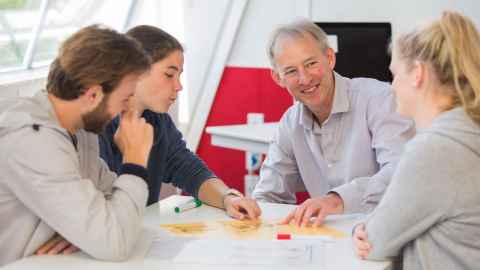Levelling up the playing field for our kids
17 April 2019
How we teach health, sport and physical education could make our society a fairer place, say leading researchers at the University of Auckland.

As part of an international study, Associate Professor Wayne Smith and Dr Rod Philpot at the University’s Faculty of Education and Social Work have been comparing PE programmes in Norway, Sweden and New Zealand.
Their conclusion: our education system is lagging behind in its ability to provide equitable and fair outcomes for our students.
Our children are not living in an equitable, inclusive society and how they are being educated is exacerbating that, not helping it, says Wayne Smith. “Since Tomorrow’s Schools was introduced in the mid-1980s, New Zealand and its education system has become incredibly unequal,” he says.
“Our schooling is divided into rich and poor schools, with the private schools and those in socially advantaged communities concentrating privilege, facilities and resources, meaning they can afford to do what they want to do.”
On the other hand, he says, our poor schools are struggling with a range of issues including social cohesion, positive school experiences, food scarcity and basic needs. By contrast, the socially democratic governing policies of Norway and Sweden provide much fairer foundations for social justice and equitable outcomes from schooling.
“In Sweden for example, the radical ‘Du’ reforms of the 1960s introduced an underpinning non-hierarchical system of mutual respect of all involved in the schools, including the teacher-student relationship,” says Dr Smith.
“This creates non-hierarchical socially-just expectations of teachers and students, and it works!" So that means no suits, no ties, and no formal dressing for distinction; most often, everyone wears jeans, principals included.
“There are also no school uniforms; in fact when Rod and I were visiting, our Swedish and Norwegian research colleagues laughed in disbelief at our Victorian school uniforms. There are also no single-sex schools, and teachers are addressed by their first name only.”
He says every child has a school lunch provided, teachers included, and teachers sit and eat with students; girls and boys of different ages from pre-school to high school all eat together and socialise.
“There is no gender divide, and everybody does PE or nobody does it,” says Dr Smith. “Despite the fact that 300,000 Syrian and other refugees have arrived in Sweden in the last few years, they provide facilities for all; accommodating the fact that Syrian Muslim girls, for example, who can’t swim with the boys, are offered swimming lessons before or after the boys get out.”
Even within an unequal system, individual teachers can make a
difference by asking, how do we marginalise, how do we privilege?
In Norway, he says, private or single-sex schools, single-sex classes, and ability grouping are forbidden, because Norwegians better recognise that they create undesirable inequitible and unjust educational outcomes.
“New Zealand has much to learn from these two countries in terms of creating equitable school outcomes, but it will require radical reforms at the structural or institutional level.”
So how can physical education and health educators in New Zealand contribute to equity despite many working in challenging situations where resources are scarce?
“There are three factors we’ve identified that teachers in any school can do to make a difference,” says Rod Philpot. “Building teacher/student relationships, in other words, creating caring connections; focusing on social cohesion, understanding where their students are coming from culturally and socio-economically, and explicitly addressing issues of social justice; so if someone can’t participate or progress for some reason, finding out why and trying to remove the barrier.”
Says Dr Smith: “Even within an unequal system, individual teachers can make a difference by asking, how do we marginalise, how do we privilege?”
As well as challenging the education system, Wayne Smith and Rod Philpot call for a ‘modest critical pedagogy’, in other words, “How much can you achieve within the constraints of the system, assuming you can’t fix the whole thing?”
The Bachelor of Sport, Health and Physical Education (BSport HPE), which is offered at the Faculty of Education and Social Work (Epsom Campus) at the University of Auckland, specifically focuses on how participants can contribute to social justice and equity in their teaching.
It's a three-year undergraduate degree aimed at coaches, health promoters and leaders outside the classroom. Students wanting to qualify as school teachers will require a further year of study.
Media contact
Julianne Evans | Media adviser
Tel: 923 6589
Mob: 027 562 5868
Email: julianne.evans@auckland.ac.nz